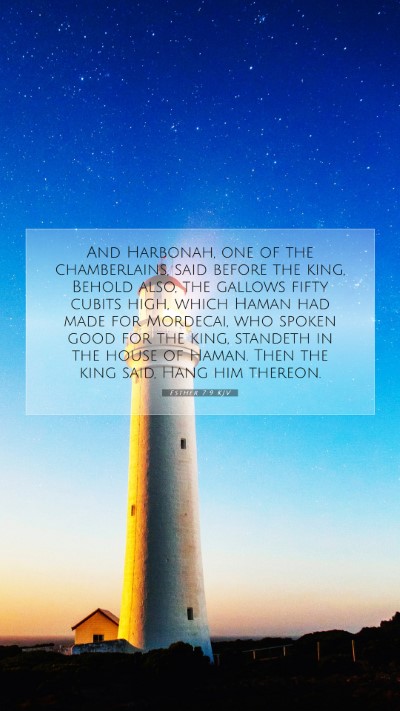Old Testament
Genesis Exodus Leviticus Numbers Deuteronomy Joshua Judges Ruth 1 Samuel 2 Samuel 1 Kings 2 Kings 1 Chronicles 2 Chronicles Ezra Nehemiah Esther Job Psalms Proverbs Ecclesiastes Song of Solomon Isaiah Jeremiah Lamentations Ezekiel Daniel Hosea Joel Amos Obadiah Jonah Micah Nahum Habakkuk Zephaniah Haggai Zechariah MalachiEsther 7:9 Meaning
What is the meaning of Esther 7:9?
And Harbonah, one of the chamberlains, said before the king, Behold also, the gallows fifty cubits high, which Haman had made for Mordecai, who spoken good for the king, standeth in the house of Haman. Then the king said, Hang him thereon.
Esther 7:9 Bible Verse Meaning
Understanding Esther 7:9
Esther 7:9 offers significant insights into the themes of justice and divine intervention. This verse unfolds at a crucial moment in the narrative, where Haman's plot to annihilate the Jews is being revealed, showcasing the providential hand of God in the unfolding events.
Bible Verse Meanings
The verse reads: "Then Harbonah, one of the eunuchs who served the king, said, ‘Look! The gallows which Haman had made for Mordecai, who spoke good on the king’s behalf, is standing at the house of Haman.’” This moment denotes a turning point where Haman's schemes are overturned, reflecting the biblical theme that those who plot evil will ultimately face their own downfall.
Bible Verse Interpretations
- Moral Justice: The commentary emphasizes that this incident illustrates God’s justice. Matthew Henry notes that the wicked often set traps for the righteous, only to fall into their own devices.
- Divine Providence: Adam Clarke highlights how God’s presence is evident even in the details of the unfolding drama, illustrating that He orchestrates events to protect His people.
- Human Agency: Albert Barnes points out that the involvement of Harbonah, the king’s eunuch, signifies that God uses various means and individuals to execute His plans, which encourages believers to recognize the broader picture of God’s sovereignty.
Bible Study Insights
Esther 7:9 serves as a rich text for Bible study groups and online Bible study, revealing principles that can be applied in various aspects of Christian living:
- Theme of Reversal: The principle of wickedness being thwarted serves as a reminder that God fights on behalf of His people.
- Encouragement in Trials: Just as Mordecai faced adversity, believers today are encouraged to remain steadfast, trusting that God can turn circumstances for good.
- Justice and Retribution: Understanding the context encourages discussions on God’s justice and how it applies to our lives today.
Application of Bible Verses
The significance of Esther 7:9 also lies in its practical application:
- Believers are reminded that wrongdoing does not go unnoticed, and a sense of trust in God’s justice is instilled through this narrative.
- This passage also encourages individuals to reflect on their own actions and motivations, as they are reminded that all will be exposed in due time.
- It inspires faith in God's ability to turn dire situations around—comforting any who feel oppressed or unjustly treated.
Scripture Analysis
In examining Esther 7:9, one can delve deeper into context and cross-references:
- Proverbs 26:27: “Whoever digs a pit will fall into it, and a stone will come back on him who starts it rolling.” - This aligns with Haman’s fate, affirming the principle laid out in Proverbs.
- Job 4:8: "As I have observed, those who plow evil and those who sow trouble reap it." - Reinforcing the theme of retribution.
- Galatians 6:7: “Do not be deceived: God cannot be mocked. A man reaps what he sows.” - This New Testament passage echoes the same mindset of divine judgment facing those who commit wrongdoing.
Conclusion
Esther 7:9 is more than just a historical account; it is a profound illustration of God’s justice and divine will manifesting in human events. By exploring its meanings and implications through established commentaries, Bible study groups can gain valuable insights and apply these lessons into their daily lives.


